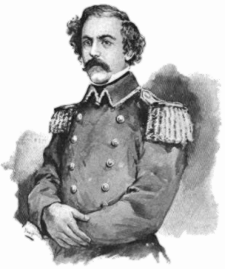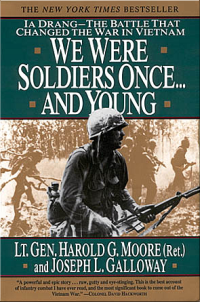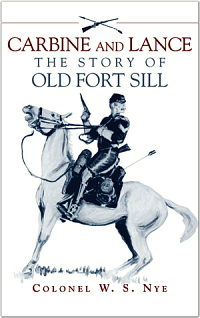Correspondence
Robert E. Lee writes to his wife from his post on the frontier.
In this enlightened age there are few, I believe, but will acknowledge that slavery as an institution is a moral and political evil in any country. It is useless to expatiate on its disadvantages. I think it, however, a greater evil to the white than to the black race, and while my feelings are strongly interested in behalf of the latter, my sympathies are stronger for the former.

To His Wife, Mary Custis Lee.
—————
FORT BROWN, TEXAS, December 27, 1856.

Robert E. Lee,
Lt. Col., Second Cavalry,
Ft. Brown, Texas, 1860.
THE steamer has arrived from New Orleans, bringing full files of papers and general intelligence from the “States.” I have enjoyed the former very much, and, in the absence of particular intelligence, have perused with much interest the series of the Alexandria Gazette from the 20th of November to the 8th of December inclusive. Besides the usual good reading matter, I was interested in the relation of local affairs, and inferred, from the quiet and ordinary course of events, that all in the neighborhood was going on well. I trust it may be so, and that you and particularly all at Arlington and our friends elsewhere are well. The steamer brought the President’s message to Congress, and the reports of the various heads of the Departments, so that we are now assured that the Government is in operation and the Union in existence. Not that I had any fears to the contrary, but it is satisfactory always to have facts to go on: they restrain supposition and conjecture, confirm faith, and bring contentment. I was much pleased with the President’s message and the report of the Secretary of War. The views of the President on the domestic institutions of the South are truthfully and faithfully expressed. In this enlightened age there are few, I believe, but will acknowledge that slavery as an institution is a moral and political evil in any country. It is useless to expatiate on its disadvantages. I think it, however, a greater evil to the white than to the black race, and while my feelings are strongly interested in behalf of the latter, my sympathies are stronger for the former. The blacks are immeasurably better off here than in Africa, morally, socially, and physically. The painful discipline they are undergoing is necessary for their instruction as a race, and, I hope, will prepare and lead them to better things. How long their subjection may be necessary is known and ordered by a wise and merciful Providence. Their emancipation will sooner result from a mild and melting influence than the storms and contests of fiery controversy. This influence, though slow, is sure.
The doctrines and miracles of our Saviour have required nearly two thousand years to convert but a small part of the human race, and even among Christian nations what gross errors still exist! While we see the course of the final abolition of slavery is onward, and we give it the aid of our prayers, and all justifiable means in our power, we must leave the progress as well as the result in His hands who sees the end and who chooses to work by slow things, and with whom a thousand years are but as a single day; although the abolitionist must know this, and must see that he has neither the right nor the power of operating except by moral means and suasion; and if he means well to the slave, he must not create angry feelings in the master. That although he may not approve the mode by which it pleases Providence to accomplish its purposes, the result will never be the same; that the reasons he gives for interference in what he has no concern hold good for every kind of interference with our neighbors when we disapprove their conduct. Is it not strange that the descendants of those Pilgrim Fathers who crossed the Atlantic to preserve the freedom of their opinion have always proved themselves intolerant of the spiritual liberty of others?
I hope you had a joyous Christmas at Arlington, and that it may be long and often repeated. I thought of you all and wished to be with you. Mine was gratefully but silently passed. I endeavored to find some little presents for the children in the garrison to add to their amusement, and succeeded better than I had anticipated. The stores are very barren of such things here, but by taking the week beforehand in my daily walks, I picked up little by little something for all. Tell Mildred I got a beautiful Dutch doll for little Emma Jones—one of those crying babies that can open and shut their eyes, turn their head, etc. For the two other little girls, Puss Shirley and Mary Sewell, I found handsome French teapots to match cups given to them by Mrs. Waite; then by means of knives and books, I satisfied the boys. After dispensing my presents I went to church; the discourse was on the birth of our Saviour. It was not as simply or touchingly told as it is in the Bible. By previous invitation I dined with Major Thomas at 2 P. M. on roast turkey and plum pudding. He and his wife were alone. I had provided a pretty singing bird for the little girl, and passed the afternoon in my room. God bless you all.


















Recent Comments